|
|
|
Sort Order |
|
|
|
Items / Page
|
|
|
|
|
|
|
| Srl | Item |
| 1 |
ID:
130702
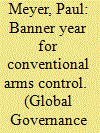

|
|
|
|
|
| Publication |
2014.
|
| Summary/Abstract |
THE CONTROL OF CONVENTIONAL ARMS HAS OFTEN SEEMED THE POOR COUSIN of the global efforts to control weapons of mass destruction (WMD). Since the advent of the atomic era, the focus of arms control and disarmament activity has been overwhelmingly on nuclear weapons and their lesser, if still ugly, stepsisters of biological and chemical weapons. The initial multilateral arms control agreements concerned themselves with limits on the testing of nuclear weapons and, shortly thereafter, with their nonproliferation (e.g., the Nuclear Nonproliferation Treaty of 1968). Bilateral US-Soviet/Russian arms control arrangements also predominantly dealt with the reduction of strategic nuclear forces and restraints on deployments of defenses against (nuclear tipped) ballistic missiles. Efforts to reduce major conventional weapon systems were also taken up in the 1980s in the context of negotiations
between the opposing alliances of NATO and the Warsaw Pact, eventually culminating in the Treaty on Conventional Forces in Europe (CFE Treaty) of 1989. This treaty provided for a massive reduction in the conventional forces that had confronted each other for years in Central Europe and established a new, far more stable security order on the continent. Even the CFE Treaty, however, tended to be overshadowed by other major disarmament agreements concluded in those heady post-Cold War days: the Intermediate Nuclear Forces Treaty (1987), Chemical Weapons Convention (1993), Comprehensive (Nuclear) Test Ban Treaty (1996), and various US-Russian bilateral strategic nuclear arms accords of the 1990s and early 2000s (e.g., the Strategic Arms Reduction Treaty and the Strategic Offensive Reductions Treaty).
|
|
|
|
|
|
|
|
|
|
|
|
|
|
|
|
| 2 |
ID:
130707
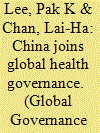

|
|
|
|
|
| Publication |
2014.
|
| Summary/Abstract |
In the wake of China's rapid ascendancy, are there any new rules made by the country in global health governance? This article examines China's emerging role in the Agreement on Trade Related Aspects of Intellectual Property Rights and finds that China adopts a pro-status quo stance on patented medicines. Aspiring to develop its own pharmaceutical sector to be capable to produce patented medicines on a par with the West, it has little appetite for using the prevailing rules or making new rules that are to the liking of the developing world. Undoubtedly, China is a new player in global health governance but has yet to have agenda-setting intent and capacity. This article argues that China's behavior and preferences can be explained by its dualistic national identities, the dominant position of realism in both the study of international relations and policy circles, and an underdevelopment of epistemic community in global health governance in the country.
|
|
|
|
|
|
|
|
|
|
|
|
|
|
|
|
| 3 |
ID:
130706
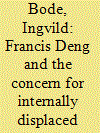

|
|
|
|
|
| Publication |
2014.
|
| Summary/Abstract |
Using the case of Francis Deng as representative of the Secretary-General for internally displaced persons as an example, this article considers how temporary civil servants may become intellectual leaders within the United Nations. During his 1992-2004 tenure, Deng managed to raise assistance and protection expectations for the internally displaced through framing their concerns in the concept of sovereignty as responsibility. He also contributed to legal change through formulating protection and assistance standards-the Guiding Principles on Internal Displacement. The article argues that a combination of three factors enabled him to exercise intellectual leadership. First, his insider-outsider position at the border between the UN Secretariat (the second UN) and the nongovernmental organizations, academic scholars, and independent experts who engage regularly with the UN (the third UN); second, his personal qualities; and third, his effective ways of framing at an opportune moment in time.
|
|
|
|
|
|
|
|
|
|
|
|
|
|
|
|
| 4 |
ID:
130700


|
|
|
|
|
| Publication |
2014.
|
| Summary/Abstract |
THE FIRST MAJOR BIOGRAPHY OF JOHN W. HOLMES CARRIES THE EMBLEMATIC title Canada's Voice: The Public Life of John Wendell Holmes.1 The title implies that here we have an example of one individual speaking for and shaping the voice of a whole nation, embodying the values and principles of Canadian foreign policy. This is, of course, a suitable title for a biography that by its very nature underlines the significance of the person portrayed. It may, however, also illustrate that we quite commonly refer to the fact that it is concrete individuals that represent abstract institutions or ideas. It is also customary for political institutions to regulate specifically who will speak on behalf of the respective entity-be it heads of state and government or executive heads of international organizations. In a static understanding of the term, representation is closely tied to questions of law and protocol defining the situations and responsibilities that are tied to the execution of political offices. But going beyond this understanding of the term for established routines and hierarchies, a dynamic understanding of the term may see it as a crucial ingredient in the growth and development of a given institution or the
idea behind that institution.
|
|
|
|
|
|
|
|
|
|
|
|
|
|
|
|
| 5 |
ID:
130705
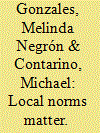

|
|
|
|
|
| Publication |
2014.
|
| Summary/Abstract |
Most states have embraced the emerging Responsibility to Protect norm, which was adopted by the UN General Assembly in 2005. R2P obliges states to prevent atrocity crimes within their own borders and not to turn a blind eye when they occur elsewhere. However, R2P's third pillar, which permits UN Security Council-authorized coercive actions, has been controversial. A few states have rejected R2P, fearing that the third pillar might be misused, while others have localized R2P (adapting it to their own preferences) or have sought to modify it globally through feedback in continuing UN discussions. This article explains the range of responses to the third pillar of R2P and explores why states employ different types of feedback, ranging from soft feedback (which seeks to build broader support for R2P) to hard feedback (which seeks to limit R2P). The article concludes that feedback reflects both national strategic concerns and preexisting local norms. Prior normative commitments to human rights and humanitarianism reduce the incidence of hard feedback whereas normative commitments to anti-imperialism and noninterference increase the likelihood of feedback seeking to constrain R2P. States with mixed commitments (e.g., to both human rights and to anti-imperialism) may offer complex, even contradictory, feedback, reflecting a prevailing national norm hierarchy, changes to which could result in changed state responses to R2P.
|
|
|
|
|
|
|
|
|
|
|
|
|
|
|
|
| 6 |
ID:
130703
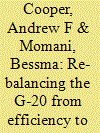

|
|
|
|
|
| Publication |
2014.
|
| Summary/Abstract |
This article contributes to the literature on global governance, legitimacy, and small states through a detailed analysis of the Global Governance Group. It examines in particular the operational impact and wider conceptual implications of the 3G's collective diplomatic efforts on the Group of 20. By engaging in a reconfigured form of informal multilateralism, the article finds that the 3G has been and is capable of shaping the global agenda with respect to the G-20 in a way that is both more inclusive and connected with existing institutions, especially the United Nations. Through this initiative, this group has effectively recalibrated the existing narrative about small states, the G-20, and global governance-shifting it from the paradigm of efficiency to one of legitimacy.
|
|
|
|
|
|
|
|
|
|
|
|
|
|
|
|
| 7 |
ID:
130701
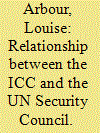

|
|
|
|
|
| Publication |
2014.
|
| Summary/Abstract |
THE POWER OF THE UNITED NATIONS SECURITY COUNCIL TO REFER COUNTRY situations to the International Criminal Court (ICC) has been hailed, particularly among international human rights activists, as a chance to expand the reach of international criminal justice by offering the opportunity to hold accountable perpetrators of atrocities who might otherwise be exempt from prosecution and punishment. The historic referral of the situation in Darfur in March 2003 was widely welcomed as an important step in the fight against impunity as was the Security Council's later, and more controversial, referral of Libya in February 2011. In principle the expansion of the reach of accountability is something to be welcomed, but it is important to recognize the costs of this expansion as well as the danger that they may outweigh the intended benefits.
|
|
|
|
|
|
|
|
|
|
|
|
|
|
|
|
| 8 |
ID:
130704
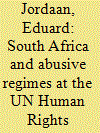

|
|
|
|
|
| Publication |
2014.
|
| Summary/Abstract |
There is some dispute over the extent to which South Africa has become a defender of regimes that abuse human rights. This article sheds further light on this question by focusing on South Africa's positions during the UN Human Rights Council's engagement with human rights problems in six countries: Democratic Republic of Congo, Israel, North Korea, Myanmar, Sri Lanka, and Sudan. In five of the six chosen cases, South Africa's attitude ranged from reluctant to obstructive of efforts to defend human rights. In only one case-Israel-was South Africa willing to bring to bear the full weight of the council's power. These findings strengthen the argument that South Africa is prone to shielding regimes that abuse human rights.
|
|
|
|
|
|
|
|
|
|
|
|
|
|
|
|
| 9 |
ID:
130708
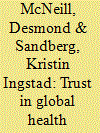

|
|
|
|
|
| Publication |
2014.
|
| Summary/Abstract |
The Global Alliance for Vaccines and Immunization provides a most interesting example of effective cooperation between international organizations-especially the World Health Organization, the UN Children's Fund, and the World Bank. Based on extensive research and interviews, this article examines how and why this cooperation came about. The role of the Gates Foundation in providing massive financial support was certainly crucial. An adequate explanation must, however, involve more than what might be called "buying cooperation"; trust played a crucial role. By studying this particular case in detail, this article raises some interesting theoretical issues about the role of trust in global governance.
|
|
|
|
|
|
|
|
|
|
|
|
|
|
|
|
|
|
|
|
|